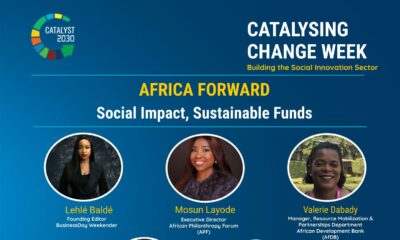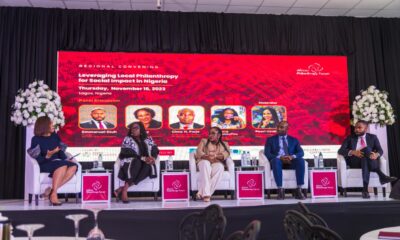Events
African Philanthropy Transforming Africa From Within: Key Takeaways from the 2024 Conference

L-R Gbenga Oyebode, Board Chair and Pioneer Board Member, Vanessa Moungar, Board Member, Swithin Munyantwali, Board Member
African Philanthropy Forum (APF) 2024 conference themed A New Agenda for African Philanthropy: Catalyzing Funding to Accelerate Africa’s Transformation closed yesterday (Tuesday 29 October) with a resolve for Africans to take ownership of their issues and to embrace a new era of philanthropy — one that is agile, collaborative, and focused on catalyzing funding to accelerate Africa’s transformation.
The high-powered two-day conference in Marrakech, Morocco brought together stakeholders, government representatives, regulators, oligarchs, financiers, and all parties interested in philanthropy for Africa from across the African continent and beyond.

Mosun Layode; Executive Director, APF
“It has been an incredible gathering and we have the key elements required to frame an agenda to catalyze funding for Africa’s transformation. More than ever, this is the time for Africans for Africa,” said Mosun Layode – Executive Director, APF.
“Our reflections from the plenaries showed the need to be intersectional and to look at things such as climate change, gender justice and education as not just sectors but as fundamental, cross-cutting considerations as we strive for development. We are also seeing the need to find creative ways to unlock funding to support philanthropy such as remittances and innovative financing mechanisms such as blended financing. More than anything, African philanthropy must begin to think through how we can move from thought to action.” continued Layode
The African Philanthropy Forum Board Chair, Gbenga Oyebode said the 2024 Conference was one of the best the APF has produced in a long time, with an exceptionally high level of discussion. It was made clear, by the conference delegates, that the APF has tremendous convening power and it remains the leading voice for philanthropy on the African continent.
“There is no other group on the African continent that can gather all these various opinions in a room and chart a future for the continent”.

Keynote Speaker, Abdou Diop. Managing Partner at Mazars Maroc.
In his keynote address Abdou Diop, Managing Partner, Mazars Maroc, said that if Africa were to reimagine philanthropy for its future it should shift from individual interventions to a systemic change in philanthropy. It would need to transition from informal to formal donations through financial and technical instruments for enhanced coordination and transparency.
Institutions should become more inclusive and communities would need to be empowered to lead their own development initiatives. The current challenges to effective philanthropy are fragmented efforts, cultural differences, and accountability issues.
Diop remarked that other African countries could learn from Morocco’s approach. By creating favourable business climates and investing in critical sectors such as infrastructure, renewable energy, and education Morocco has not only positioned itself as a regional leader but has attracted philanthropists and development partners. Its collaborative policies that attract foreign investments and foster public-private partnerships are key to this success.
Despite the continent’s opportunities, philanthropic support falls below expectations and fails to match external efforts. This trend highlights the urgent need for a paradigm shift to ensure that African resources are utilized to address African challenges. Similarly, funding from the Global North has a history of being sub-optimally aligned with the continent’s priorities.

Eme Essien Lore
Eme Essien Lore Co-Founder, Wealth4Impact and moderator of the Unlocking and Redirecting Funds Flows for Transformative Impact plenary pointed out that, despite a dramatic increase in remittances, and philanthropy from abroad into Africa, there is still a need for greater alignment to local needs.
Delegates learned that, in the future, the number of African millionaires is expected to increase by 56%. “There is wealth on the continent, but it is a very concentrated wealth and the only way it can be shared is through the traditional ways of philanthropy.”
“African people are already giving. Not only those representatives from a high-income bracket but also those from the upper middle-income category who are actively contributing would readily grant substantially larger amounts if they had assurances that their offers were used more sustainably. The challenge is to use this funding strategically to unlock other funding” noted Degan Ali, Executive Director of Adeso.
While speaking during the fireside chat, Lisa Issroff, Co-Founder of the Issroff Family Foundation, reflected on how her upbringing in South Africa inspired her to commit her resources and time towards philanthropy. She also emphasized the importance of involving all relevant stakeholders in efforts targeted at developing Africa.
The conference ended with the New Agenda for African Philanthropy session where delegates reflected on extensive deliberation and addressed the grand objective of the conference – what the new agenda for African Philanthropy ought to be.
About African Philanthropy Forum
African Philanthropy Forum (APF) is a strong and vibrant community of partners who through their strategic giving, investments, and influence, foster shared prosperity on the African Continent. It was incubated by the Global Philanthropy Forum (GPF), a global network of strategic philanthropists and social investors committed to international causes from 2014 to 2016. In 2017, APF became an independent entity and continues to be an affiliate of the GPF.
Over the years, APF has established a strong presence on the Continent, with footprints in Cameroon, Côte d’Ivoire, Egypt, Ethiopia, Ghana, Kenya, Malawi, Morocco, Nigeria, Rwanda, South Africa, Tanzania, Uganda, and Zimbabwe through convenings and activities. APF has also invested in the development of two Toolkits for African Philanthropists and the “Why Give” Series, which consists of interviews with Africa’s strategic philanthropic leaders to showcase their motivations for giving.
Since its inception, APF has reached over 2,500 philanthropists, social investors, and key stakeholders in the philanthropic space across Africa and the world. Through APF’s high-impact convening and initiatives, the organization has facilitated collaborations, amplified the work of change-makers, and shared best philanthropic practices and strategies for promoting homegrown development.

Gbenga Oyebode

L-R Gbenga Oyebode, Board Chair and Pioneer Board Member, Mosun Layode, Executive Director, APF, Vanessa Moungar, Board Member, APF, Ngozi Obigwe-Kunuji, Head of Operations, APF and Swithin Munyantwali, Board Member

Audience Overview – Gbenga Oyebode on stage-Board Chair, APF

Aishah Ahmad


Sponsored Content


















